

Figure. Heteroteuthis sp. A. Left - Ventrolateral view. Right - Ventral view with mantle cavity opened. Photographs by R. Young.
- Arms
- Suckers globular with small aperatures; suckers approximately equal in size between arms; suckers with circularis muscles.
- Deep web joins all arms to each other except arms IV.
- Suckers globular with small aperatures; suckers approximately equal in size between arms; suckers with circularis muscles.
- Tentacles
- Tentacular club short, coiled aborally. Suckers in numerous irregular series.Tip of club without suckers. Suckers increase in size distally; largest suckers about 0.04 mm in diameter.
- Dorsal region of oral surface of club, immediately distal to tentacular organ, with series of folds.
- Tentacular organ present; barely overlaps base of sucker-bearing club.
- Tentacular stalk broader than club.
- Tentacular club short, coiled aborally. Suckers in numerous irregular series.Tip of club without suckers. Suckers increase in size distally; largest suckers about 0.04 mm in diameter.
- Head
- Eye with cornea; secondary eyelid at anteroventral half of eye.
- Olfactory organ not recognizable.
- Funnel
- Funnel valve could not be found.
- Dorsal funnel organ poorly defined but small anterior tip and slight medial ridge present. Ventral organs not detected except for a possible anterior lobe of right organ.
- Fins
- Fins short; fin length about half ventral mantle length.
- Fins attach on posterior half of mantle.
- Posterior margin of fins rounded.
- Pigmentation
- Funnel with distinctive pigment pattern: Bare region midventral at bend; pair of bare regions just posterior from this; single line of chromatophores extends to each funnel locking-apparatus and beneath it. Dorsal surface of funnel unpigmented except at tip.
- Fins with scattered chromatophores dorsally, none ventrally.
- Thick, silvery patch of iridophores on posteroventral surface of funnel, overlaps most posterior row of funnel chromatophores and lies over anterior region of ventral shield (see photograph above and labeled photograph under "Photophores").
- Clear patch of tissue ventral to eye and anterior to lateral funnel adductor apparently absent.
- Aboral surface of tentacular stalk and club covered with numerous, non-overlapping chromatophores. Oral surface of club with many, small chromatophores beneath suckers.
- Lining of mantle cavity (mantle and visceral cover) without chromatophores.
- Funnel with distinctive pigment pattern: Bare region midventral at bend; pair of bare regions just posterior from this; single line of chromatophores extends to each funnel locking-apparatus and beneath it. Dorsal surface of funnel unpigmented except at tip.
- Photophores
- Pores to visceral photophore seem to be more lateral than typical in Heteroteuthis but ducts penetrate directly through "lens" into photophore.
- Pores to visceral photophore seem to be more lateral than typical in Heteroteuthis but ducts penetrate directly through "lens" into photophore.
- Viscera
- Nidamental glands large (each 2.5 mm x 1.3 mm) but not as large as expected if animal mature.
- Oviducal opening with two long, slender flaps.
- Measurements: Sex - female, apparently immature. Ventral mantle lenght - 17 mm; shield length - 7 mm; dorsal mantle length - 12.3 mm; mantle width - about 11 mm; club length - 2.5 mm; largest club suckers - 0.04 mm in diameter; fin length - 8.9 mm; fin width - 5.7 mm; arm I length - 5.5 mm; arm II length - 5.4 mm; arm III length - 6.2 mm; arm IV length - 5.6 mm; largest arm suckers - 0.3 mm in diameter.

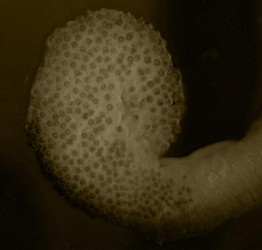
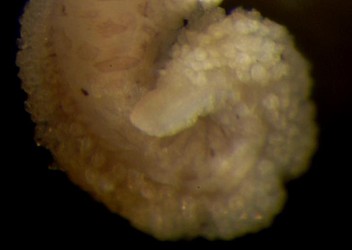
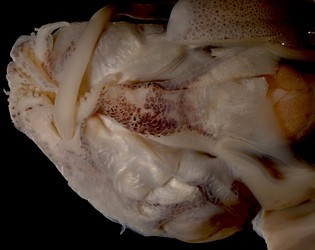
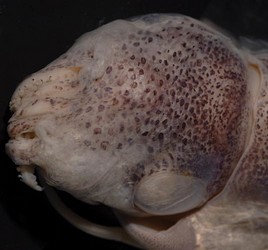
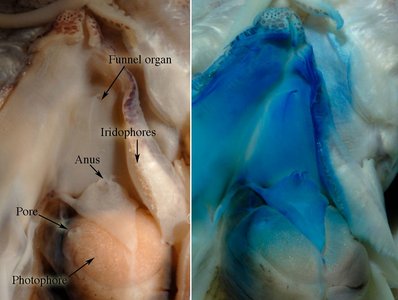




 Go to quick links
Go to quick search
Go to navigation for this section of the ToL site
Go to detailed links for the ToL site
Go to quick links
Go to quick search
Go to navigation for this section of the ToL site
Go to detailed links for the ToL site